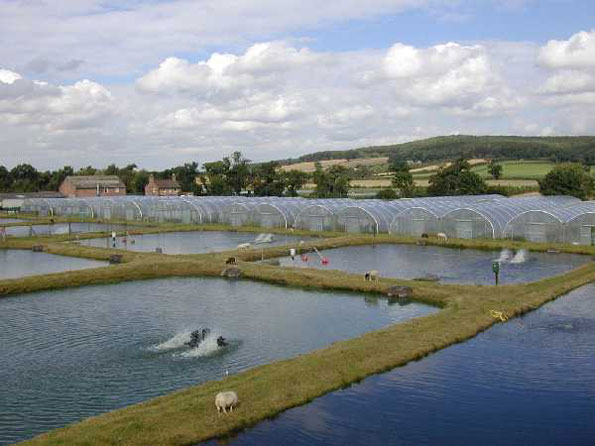The Environment Agency fish farms at Calverton and Leyland have lifted their self-imposed ban on using only Tench Rhabdovirus-free broodstock, following a two-year investigation into the disease and its distribution in rivers across England and Wales.
The investigation was prompted by an outbreak of the disease in 2004 at the two fish farms, and the subsequent decision to clear and disinfect both farms as a precautionary measure.
“The 2004 decision was not an easy one because we knew very little about the distribution and the threat of the disease. The virus had only been seen once before in the UK and had been connected with a number of fish deaths,” explained Environment Agency Fisheries Policy Advisor Paul Lidgett.

Calverton fish farm in Notts.
“We could not allow potentially infected fish to be stocked into the wild and put fisheries at risk. Since then we have only used broodstock that has tested negative for TeRV antibodies. This has meant that we have become dependent on just a few sources of broodstock, thus putting the long-term production of certain species, especially chub, dace and barbel, at risk.
“Since 2004 we have been using a new technique developed by the Centre for Environment, Fisheries and Aquaculture Science that identifies which fish have been in contact with the disease. This has helped us collect more information on the distribution of TeRV. We have used this information to review whether the disease poses a continued threat to our coarse fish farms and wild stocks of coarse fish.”
This review has concluded that TeRV is widespread in most rivers throughout England and Wales including the Thames, Severn, Trent and Great Ouse, and that there is no evidence of an impact on these populations of wild fish.
The evidence was presented to the Environment Agency’s Category 2 parasite review group, an expert panel of fish health scientists, in June. The panel consisted of, Nigel Hewlett, and Chris Williams from the Environment Agency, Professor Jimmy Turnbull from Stirling University, Dr Ruth Kirk from Kingston University, Bernice Brewster, a private fish health consultant, and Dr Steve Feist from the Centre for Environment, Fisheries and Aquaculture Science.
“The review group agreed with our findings and recommended the Environment Agency lift its ban. The decision means there are now no restrictions on broodstock selection and our restocking programmes will continue unabated,” continued Paul Lidgett.
Alan Henshaw, from the Evironment Agency’s Calverton Fish Farm said: “This does not mean we do not consider TeRV a threat to our fish farms. Any disease on a fish farm can cause problems. However, both Calverton and Leyland now have the latest biosecurity measures in place and this will reduce the risk from TeRV and other diseases.”






